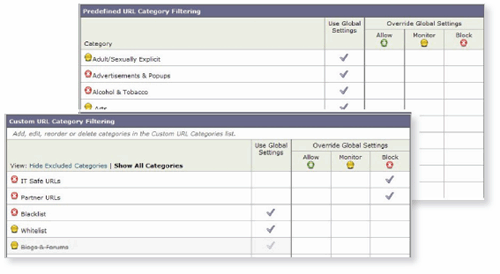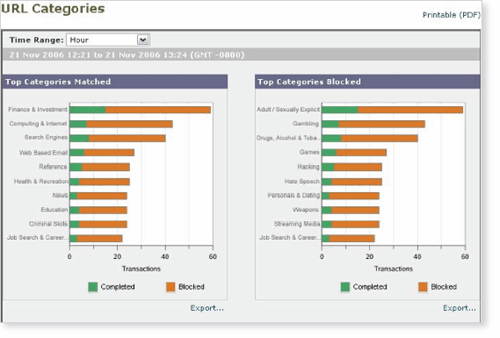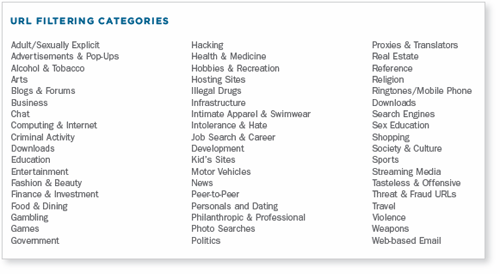
Cisco URL Filters
Today, the Internet is an enormous resource for organizations, facilitating communication and offering easy access to an enormous wealth of information. At the same time, Internet access can present a major productivity and legal risk. IDC estimates that close to 40 percent of a corporation's Internet traffic is non-business related — representing a real and significant drain to both employee productivity and network resources. In addition, with an estimated 10 billion webpages today (growing at close to 30 percent annually), unregulated browsing inevitably results in acceptable use policy violations — exposing companies to serious legal liabilities.
Cisco IronPort URL Filters™ uniquely combine a high-performance scanning engine with the industry's broadest Web database to provide a fast and accurate content filtering solution. A key component of the Cisco IronPort acceptable use policy framework on the Cisco IronPort S-Series™, Cisco IronPort URL Filters rapidly scan employee browsing requests and evaluate them against corporate-specific policies — leveraging a highly accurate database of scored websites. By preventing employees from accessing sites that violate policies, organizations can now harness the benefits of the Internet while minimizing the associated productivity, resource and legal risks.
The Cisco IronPort S-Series is the only solution to combine Cisco IronPort URL Filters with Cisco IronPort Web Reputation Filters™ and the Cisco IronPort Anti-Malware System™ to provide a single, integrated solution that ensures that a corporation's Web traffic is accurately scanned for both acceptable use violations and security threats.
Features:
Accuracy
Powered by one of the industry's largest Web databases, Cisco IronPort URL Filters provide administrators with over 50 content categories and more than 20 million websites (corresponding to over 3.5 billion webpages), across 70 languages and 200 countries.
The highest quality database drives Cisco IronPort URL Filters. This database is sourced through automated Web crawling and classification technologies, combined with the human oversight provided by a global team of professional researchers. Periodic, automated ageing out of unused domains and sites, along with daily updates of millions of new URLs, helps maintain the industry's highest quality Web filtering database.
Broad international coverage ensures that Cisco IronPort URL Filters can accurately block websites, regardless of where the destination URL points. Today, an increasing number of websites hosting inappropriate content—adult, gaming, gambling and more—are set up using international domains to thwart URL filters.
Granular classification of websites means greater flexibility for organizations in defining and enforcing acceptable use policies. Support for unlimited custom categories (based on IP addresses, subnets, CIDR ranges, URLs, domains and regular expressions) provide additional agility in responding to violations.
Automatic, incremental Web database updates add more than 100,000 new sites and 10 million new URLs weekly to ensure ongoing accuracy. Administrators configure the update schedule to check for new rules as frequently every five minutes.

Pre-defined and unlimited custom URL categories provide granularity, flexibility and control in implementing enterprise policies.
Policy control
Powerful and flexible authentication ensures seamless integration with corporate environments. Administrators can create policies based on existing LDAP-based or Active Directory-based directory structures. Single sign-on capabilities provide a seamless end-user experience while surfing the Web. Administrators can also create authentication exemptions based on source or destination traffic profiles.
Granular policy creation using Cisco IronPort Web Security Manager™ allows administrators to create and manage policies on a per-user and per-group basis — thereby providing tremendous flexibility and control. Cisco IronPort Web Security Manager enables automatic sync-up with existing authentication directories to provide a list of active groups. This enables administrators to further refine pre-existing LDAP-based or Active Directory-based groups. Administrators can define groups using network segments, IP addresses, subnet or CIDR ranges, as well as combine multiple network segments or separate groups into a single unit.
Consolidated policy management with Cisco IronPort Web Security Manager unifies security policies implemented across logical business groups. This tool is flexible and easy-to-use, allowing administrators to manage URL filtering policies from a single GUI.
Comprehensive application, object and protocol filtering enables administrators to configure per-user and per-group controls, which apply to all HTTP and HTTPS traffic. Administrators can choose to block or allow applications such as instant messenger (IM) or Skype traffic tunneled through HTTP. Additionally, object filtering (based on "true type") accurately recognizes objects to restrict object and file downloads that present security and/or compliance risks. Warn/continue pages can also be implemented for soft blocking of URL categories, enabling organizations to educate users on corporate acceptable use and security policies.
Customized and localized notifications automatically alert end-users to policy violations that impact their Web browsing activity. Administrators choose system-determined notifications across more than 25 trigger events or redirect to a separate customizable internal policy page. The ability to customize allows administrators to maximize the educational opportunity of a blocked Web request. End-user notifications can be selected in ten different languages, to ensure compliance with local regulations and business requirements. Available languages include English, French, German, Japanese, Spanish, Korean, Portuguese, Thai, Traditional Chinese and Simplified Chinese.
Visibility
Easy-to-understand reports provide extensive information on overall Web traffic. At-a-glance reports indicate a corporation's current Web traffic usage, with more granular reports detailing top resources in use, on a per-user and per-category basis. Reports assist in identifying the top users within the network that comply or violate corporate acceptable use policy. Reports also provide detailed and summary information on bandwidth saved as a result of URL filtering. Administrators can use pre-defined reports or develop custom reports and notifications.

Understand at-a-glance the Web traffic blocked versus allowed, on a per-category basis.
Extensive logging lets companies track all Web traffic, benign and threat-related. Standard log formats include Apache, Squid or Squid-detailed—along with the ability to specify custom log formats, consistent with corporate logging policies. Administrators can enable or disable log subscriptions, or set log rollover and size limits, based on log types.
Comprehensive alerting, included with every Cisco IronPort S-Series appliance, supports Cisco IronPort URL Filters. Administrators can set up individual alert subscriptions, based on severity levels. Alerts are calibrated in three categories: informational, warning and critical. This provides administrators with clear visibility into the application and enables them to take appropriate and timely action, if required.


